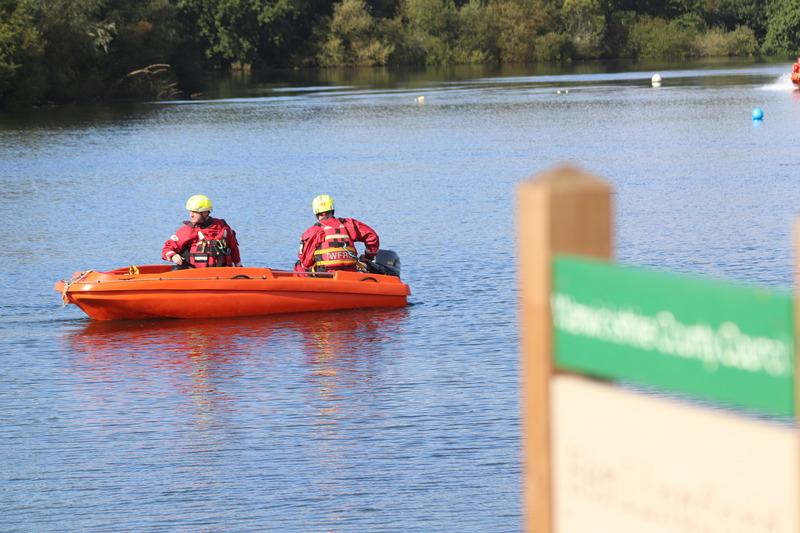Helping Warwickshire be Better Prepared this Flood Action Week

Warwickshire residents can become better prepared for flooding, with advice from the Environment Agency this Flood Action Week.
Warwickshire Local Resilience Forum (WLRF) is a partnership which aims to help Warwickshire prepare for, respond to and recover from emergencies, working with partner organisations from the public, private and voluntary sectors, including the Environment Agency.
During Flood Action Week, running from Monday 20 November to Sunday 26 November, WLRF is keen to signpost you to the many simple ways you can prepare yourself, your family and your property to minimise the risks of flooding.
In the colder months, the ground can become harder and increase the risk of flooding near you. To learn more and prepare for the risk in your part of Warwickshire, you can check for active flood alerts and warnings, and check the flood risk for the next five days.
Signing up for flood warnings will also ensure you find out about a developing flood near you as soon as possible, via a phone call, text message or email.
Checking the long-term flood risk for your area will help you understand how you can help yourself and your community be better prepared for flooding in the future.
If you receive a flood warning, it’s important to:
• move vehicles to higher ground if it’s safe to do so;
• move family and pets to safety;
• move important items upstairs or to a safe place in your home;
• prepare a bag that includes medicines and insurance documents;
• turn off gas, electricity and water supplies if it’s safe to do so (never touch an electrical switch if you’re standing in water); and
• use property protection products like flood barriers or air brick covers, if you have them.
Planning is key to being prepared in an emergency. Use these templates to create a personal flood plan, a community/group flood plan or a business flood plan and ensure you have everything you need near you. Keep physical and digital copies of these, and keep your flood plan in a safe place with other key items, like spare medication, important documents and emergency contact details.
WLRF held a successful flooding response exercise in September 2023 to bring all its partners together from emergency services, the Environment Agency, local authorities and more. Its week-long work through ‘live play’ and simulated meetings will help WLRF partners make Warwickshire better prepared for incidents and emergencies relating to flooding.
You can find out what support is available near you before, during and after a flood, such as:
• Flood action groups – volunteers who work with local councils and agencies to reduce flood risks and represent you;
• Community flood wardens – volunteers who monitor a specific area and tell residents when flooding is likely; and
• Community hubs – where you can find food, clothing, shelter and advice during a flood.
You can find these on social media, on your local council’s website and by contacting the National Flood Forum.
In a flood, it’s key that you don’t drive or walk through flood water. Floodwater currents are stronger than they appear, and can sweep you away or disable vehicles easily. Deep and murky floodwater can also hide sharp and solid fast-moving objects which can seriously injure or knock you off your feet.
WLRF Co-Chair, and Deputy Chief Constable at Warwickshire Police, Alex Franklin-Smith said:
“Flood Action Week is a crucial part of our calendar as a Local Resilience Forum, particularly as it lines up with the challenging weather we can often experience as we head into the colder months.
“We’re really keen to share this advice on how people can better prepare for flooding, as many of the best things you can do are actually very straightforward.
“Signing up for flood alerts and warnings and checking the forecast for the next five days are really easy ways to get an idea for what’s to come and ensure you have food, supplies, medicine and everything you might need if flooding makes it difficult to leave home.”
Fellow WLRF Co-Chair, and Chief Fire Officer at Warwickshire Fire and Rescue Service, Ben Brook added:
“Even though we have no coastline here in Warwickshire, as we’ve seen in recent months with Storm Babet and Storm Ciaran, our county is not immune to the effects of flooding.
“It’s so important to take the time to learn what you can do to prepare for emergencies like this. Things as simple as setting up flood alerts to give yourself a heads-up, and having several days’ worth of food at home at a time going into winter will make a huge difference. We can’t stress enough how important it is to prepare, and know what to do in emergencies, before you need to. Small steps now will save lives in the future.”
Alan Lovell, Chair of the Environment Agency, said:
“With a changing climate, the frequency and severity of flooding will only get worse. So far, this year has seen two devastating named storms, while the Midlands recorded its wettest-ever three-day period.
“Our work during Storm Babet protected nearly 100,000 properties and we’re investing millions into keeping communities safe, but we know that some flooding can’t always be prevented. That’s why it’s essential you know what to do in a flood.
“Knowing just one action can reduce the effects on your home and family and even save lives. Anyone can go online to check if they are at risk, sign up for Environment Agency warnings and crucially, know what they need to do if flooding hits.”
